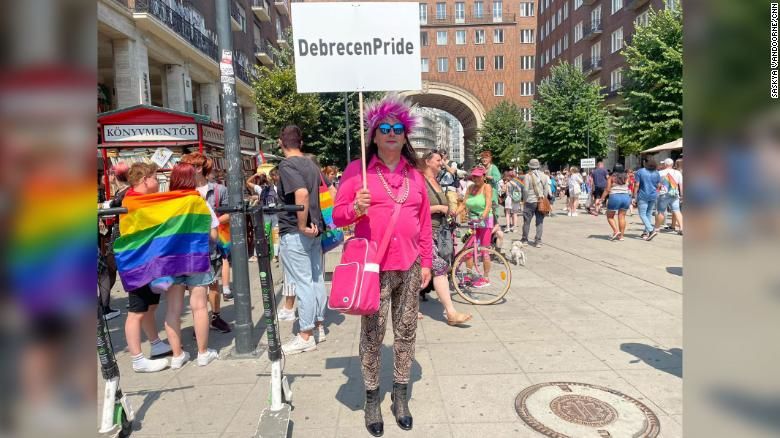
Thousands join Pride event in Hungary as LGBTQ people face growing hostility
But this year, Pride is also a protest, as LGBTQ people and their allies rally against the country's increasingly hostile policy towards their communities -- punctuated by a new, homophobic law recently passed by Hungary's hardline government.
Andras Szolnoki, 55, an anthropologist from the eastern city of Debrecen, said he joined the march in rebuke to "Orbán's regime and for the rights of LGBTQI people who have been targeted by the government for the last four years."
For Szolnoki, only a "revolutionary approach" would change the status quo in Hungary, where last month, right-wing populist ministers passed a law essentially banning LGBTQ issues from being discussed in school.
"It's more than just a march," Szolnoki told CNN. "It's about Hungary joining the Europeans and showing equality."
 Andras Szolnoki, 55, says a "revolutionary approach" is necessary to change things in Hungary.
Andras Szolnoki, 55, says a "revolutionary approach" is necessary to change things in Hungary.
The new law, supported by Prime Minister Viktor Orbán, bans all educational materials and programs for children that are considered to promote homosexuality and gender reassignment.
Off the back of fierce international criticism, including a scolding assessment (and a push for its repeal) by the European Union, of which Hungary is a member, Orbán has proposed to hold a referendum that will ask the public if they support the "promotion" of content related to sexual orientation to children.
The Prime Minister is urging a "no" vote. But for the people gathered for Pride on Saturday, the answer is a resounding yes.
Critics of the law argue that holding the referendum -- a five-question vote -- is problematic in itself.
LGBTQ activist Akos Modolo, 26, told CNN that the issue with the referendum is that it presents very "leading questions" to the public, noting similarities to a 2016 referendum on the EU's refugee resettlement plan. Hungary rejected that proposal but failed to reach a voter turnout threshold, making the referendum not legally binding.
"Even if you support LGBT rights, you wouldn't automatically say yes to these questions," Modolo said. "The government is using this as a political tool," he said, explaining that the government's strategy is to "always look for an enemy to blame" in order to "appeal to the anger of the voters."
"It's important to have a discussion," Modolo added. "But this is not a discussion -- it's a hate campaign."
 Akos Modolo, 26, says the referendum is inherently flawed.
Akos Modolo, 26, says the referendum is inherently flawed.
Saturday's showing was one way that LGBTQ activists are pushing back against that discrimination.
Balint Rigo, 27, one of the Pride organizers, told CNN that "a lot has happened over the last few years, and it's time to show that we're not okay with it."
"Minorities have been systematically attacked, and we're here to say enough," Rigo said, adding that this year's event is expected to see far more attendees than previous years, which have drawn crowds of up to 20,000 people.
That's because "people aren't just coming out for LGBTQ groups," Rigo said, "they're coming out for minorities in general."
"There's power in numbers and we may not be able to change anything in the short term, but together we're a symbol of solidarity," he added.

A 2020 report from the Bratislava-based global think-tank Globsec found that the majority of Hungarians disagree with the demonization of the LGBTQ community, with 55% disagreeing with the statement that LGBTQ rights represent a decadent ideology, despite the anti-gay rhetoric whipped up by the current government.
Nearly half of Hungarians agree with guaranteeing rights for LGBTQ people, according to the report.
Yet some believe that years of state-sponsored homophobia is finally taking its toll.
In the southern city of Szeged, partners Reka Spohn and Monika Rapi say that they and their two daughters have always felt accepted in their community. But the government's latest move has changed all of that for them.
"They (the government) are acting like we are a hazard for children, that we are dangerous to children," Sphon said.
"If they say it enough times, people will start to believe it," she added.
She notes the visibility of anti-LGBTQ billboards across the country.
The government campaign, billed as a public consultation ahead of the referendum, asks leading questions, with emojis attached to them. In the capital, the propaganda is visible on almost on every street corner, with signs asking the questions: "Are you angry with Brussels?" and, "Are you worried that your child will face sexual propaganda?"
The new law says that school sex education classes be taught only by groups registered by the government, with teachers prohibited from teaching books with LGBTQ characters or themes.
It also prohibits the representation of LGBTQ people on television during daylight or early evening hours.
While Orbán says that the law is not about violating LGBTQ rights, but about preserving parents' rights to choose how to educate their children, Spohn says that the message is clear.
"They act like we don't exist," she said.
The couple are prepared to flee the country if things get worse -- an idea that is being considered by many across Hungary's LGBTQ communities.
But others still feel the battle is worth fighting for at home.
In November, Hubert Hlatky-Schlichter and his father, who is gay, launched a campaign to raise awareness about rainbow families -- defined as a family with one parent who identifies as lesbian, gay, bisexual, trans, intersex or queer.
"This is just the beginning, because we are everywhere," Hlatky-Schlichter said.
"Our existence is not propaganda. The very existence of rainbow families is not propaganda," said Balazs Redli, a father. Redli, a journalist who's worried about the future his son will face, says there's space for everyone in Hungary.
"We just want to live in this country like everyone one else does."










